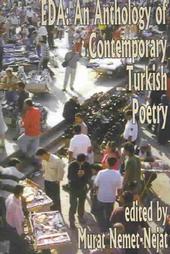





|
Ideas Towards a Theory of Translation in Eda
1) “No gendered pronouns, no stable word order, Turkish is a tongue of radical melancholia.“ “The Idea of a Book,” Eda: an Anthology of Contemporary Turkish Poetry, 2003
The above statement, which seems to be about the Turkish language, in truth is also an analysis of English. The statement asserts a tension, a dialectic between the two languages, removing the grammars of both from their states of naturalness. Substantiating them both, it turns them both into distinct systems of contemplation -what is there, and what is not here..
For instance, the natural thing for a Turkish translator to do is to use the appropriate gender pronoun in given passages. In Eda, I follow the reverse system. Unless the gender reference is absolutely specific, I shift the pronoun. This method -which results in a “translated text” which is more distant, more unsettling to the host reader- has two reasons. A submerged theme of coded homosexuality exists in the 20th Turkish poetry, a theme that gradually is liberated and comes to the surface. The Eda anthology is interested in this process of liberation.
Second, because the very concept of distinctions, between animate and inanimate, object and human, male and female, love and sex, human or divine does not exist in Sufism, which is the metaphysics at the heart of this language and poetry.
Consequently, the strategy of distance, of subtle disorientation becomes a portal to enter, or at least get a hint of, a completely different cultural matrix. The translation involves itself not only with individual poems, but also the society, the city, the culture in which the poem lives, from which it derives. The radical melancholia is hooked to a specific mode of consciousness, as it works itself through a specific language.
The Hour of Sleep
Seeing me he came from you wanting himself, love, I was in you, let him take from me, the wanter, what he wants
I am near you, I came near you, me, hasn't flown yet, will go then, you, time then, for your want.
Waited for your arrival, with you, near, next someone someone, with me I’ll love him, he forgot it before,
Forgetting, he slept, the before, with the one there, but he says he compares tears to me, his better self, sleeping forget, said, hey you, the one here.
More than me you, I’ll remember, I sleep in you, me if you want to see, come, look where I sleep.
Romeo, my Romeo's leaving me, when you wake up, turn back, my lover, here, towards you, as I sleep, me, on the road you meet, me, I'll meet you.
I had arrived, here, I want to find, here, again, as I wake up be near me you found me only I love as much as you love me, you.
Don’t lie, love invisibly, me, there where you spent the night search me, can you sleep, then, near me, in you.
Let's sleep, let's, one-two-three-thirty, four-five-six-thirty, seven-eight-nine-thirty, ten-thirty, sleep time.
Once more, once more, once more, I want to start from scratch.
Once more, once more, once more, what doesn't stop stop.
Once more, once more, once more, what runs away, follows.
(from Romeo and Romeo, by Ahmet Güntan, 1995, translated from Turkish by Murat Nemet-Nejat)
II
“As much as a collection of translations of poems and essays, this book is a translation of a language. Due to the fortuitous convergence of historical, linguistic and geographic factors, in the 20th century -from the creation of the Turkish Republic in the 1920's to the 1990's when Istanbul/Constantinople/Byzantium turned from a jewel-like city of contrasts of under a million to a city of twelve million- Turkey created a body of poetry unique in the 20th century, with its own poetics, world view and idiosyncratic sensibility. What is more these qualities are intimately related to the nature of Turkish as a language -its strengths and its defining limits. As historical changes occurred, the language in this poetry responded to them, flowered, changed; but always remaining a continuum, a psychic essence, a dialectic which is an arabesque. It is this silent melody of the mind -the cadence of its total allure- which this collection tries to translate. While every effort has been made to create the individual music of each poem and poet, none can really be understood without responding to the movement running through them, through Turkish in the 20th century. I call this essence eda, each poet, poem being a specific case of eda, unique stations in the progress of the Turkish soul, language.
In The Task of the Translator Walter Benjamin says that what gives a language ‘translatability’ is its distance from the host language. Eda is this distance. “
“The Idea of a Book,” Eda: an Anthology of Contemporary Turkish Poetry, 2003
In Eda a state of being is transformed into a movement, dance of language. It does so by creating a narrative in which there are three characters. The first is the city of Istanbul, the body, the space in which the movement of the spirit occurs. The second is Turkish itself, a totally agglutinative language, with an absolutely flexible, permutable word order, which enables the language to record very subtle nuances of feeling, to record the process of perception as it emerges. The third is Sufism, originating from Central Asian Shamanism, which intuits a deep unity in multiplicity, in chaos. This impulse to unity balances the vertiginous impulse of the Turkish language and society towards chaos. It enables a state of extreme differentiation, in culture and poetry, to thrive as a living organism.
In Eda both sides of the translation pole see themselves in a new way, emerging from out of their systems. Turkish becomes aware of Eda as an organizing principle. In point of fact, this anthology, which includes many essays, basically written as a tool of understanding for Western audiences, has had a surprising and crucial function of self-definition for Turkish poets and critics. For once, they were able to see their achievements in their own terms, without being co-opted by Western terminology or thought systems, such as surrealism or symbolism, etc.
For the Western reader the situation is more complex, because Eda avoids familiar templates, points of reference to make the material familiar. The relationship is tangential, the text existing as a meta-language, which basically what translation is. Its presents to the host language reader a field, a dream of possible alternatives, which the host language can or may not take.
In that way, in a translation both languages move to a third place where language sees or may have the possibility of seeing itself in a new perspective, in that way transforming itself.
Sleep
Sleeping you depart, forgetter of your leaving is, me as I return from sleep, get, you return from sleep, you.
As I return from sleep if you return into me, there forget what it forgot, you.
Sleep with me, you, in sleep you depart, from me, in sleep I forget, I, I depart, from you.
The sleeper departs, departer sleeps, the mark in sleep, me, I'll lull to sleep, in me, what repeats itself.
Once more, once more, once more, I want to start from scratch.
Once more, once more, once more, what doesn't stop stop.
Once more, once more, once more, what runs away, follows.
(from Romeo and Romeo, by Ahmet Güntan, translated from Turkish by Murat Nemet-Nejat)
|
respiro@2000-2004
All rights reserved

